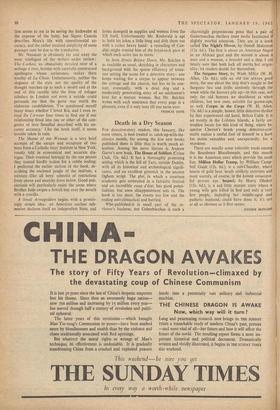Death in a Dry Season
FOR detective-story readers, this January, like most others, is best treated as catch-up-with-the- classics month, for among the few new books published there is little that is worth much at- tention. Among the more literate is Andrew Garve's new book, The House of Soldiers (Crime Club, 12s. 6d.). It has a thoroughly promising setting which is the hill of Tara, outside Dublin, with all its historical and archmological signifi- cance, and an excellent gimmick in the ancient Ogham script. The plot, in which a uxorious academic gets embroiled in a fantastic festival and an incredible coup d'etat, has good poten- tialities, but soon disappointment sets in. The book is too short, the events too few and the ending anti-climactical and hurried.
Who-published-it is small part of the re- viewer's business, but Gaberbocchus is such a
charmingly preposterous press that a pair of Gaberbocchus thrillers must invite fascinated if slightly morbid attention. They are in a book called The Night's Moves, by Oswell Blakeston (12s. 6d.). The first is about an American Negro in an African gaol and the second is about a man and a woman, a bracelet and a ship. I am nearly sure that both lack all merits but origin- ality; let readers decide for themselves.
The Sargasso Story, by Wade Miller (W. H. Allen, 12s. 6d.), tells an old but always good story, the one about the ship that's caught in the Sargasso Sea and drifts aimlessly through the weed while the horrors pile up—in this case, not only the old horrors we shuddered at when children, but new ones, suitable for grown-ups, as well. Corpse in the Cargo (W. H. Allen, 13s. 6d.) is a simple, honest little detective-thriller by that experienced old hand, Belton Cobb. It is set mostly in the Lofoten Islands, a fairly un- trodden locale for this kind of thing, where In- spector Cheviot's brash young detective-con- stable makes a useful fool of himself in a hunt for stolen valuables and, unexpectedly, for a murderer.
There are usually some tolerable reads among the Boardman Bloodhounds, and this month it is the American ones which provide the most fun. Million Dollar Tramp, by William Camp- bell Gault (12s. 6d.), is a sub-Chandler, where hearts of gold beat 'neath unlikely exteriors and most warmly, of course, in the honest unsuccess- ful private eye. Impact, by Harry Olesker (12s. 6d.), is a sad little murder story where a young wife gets killed in bed and only a very few people, including her middle-aged and pathetic husband, could have done it; it's not at all as obvious as it first seems.
ESTHER HOWARD


































 Previous page
Previous page